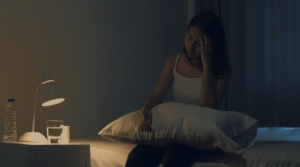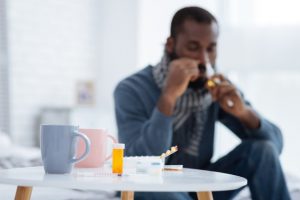Is sleep something we take for granted? Quality sleep allows your mind and body to heal, and getting a good night’s rest is something most people, especially younger adults, don’t need to worry about. How
are adults with substance use affected, though? Isn’t that something your mind and body accomplish naturally?
Unfortunately, we are not all that lucky. People who struggle with problematic substance abuse or mental disorders both frequently report poor sleep quality, or insomnia, as one of their symptoms. The issues that come with insomnia go way beyond just being tired. When sleep problems become a reoccurring issue, your life begins to unravel. It’s no surprise that when people struggle with substance use disorder, they diminish their ability to fall asleep naturally. Illicit drug use becomes habitual, and your brain becomes dependent on the drug’s presence to function correctly. Continued use gradually causes your brain to function worse; it eventually struggles to perform essential functions, like falling asleep.
Unfortunately, illicit drug use is more prevalent among American older adults than among middle-aged adults in almost any other country in the world. According to a study, the rise in use of alcohol and drugs is in large part attributed to baby boomers born between 1946 and 1964.
In this article, we will discuss evidence-based practices for substance use disorder to overcome related sleep issues.
Co-Occurring Mental Health
Co-occurring mental health issues, also known as comorbidity or dual diagnosis, happens when a person is experiencing more than one mental health disorder. It’s very common for a person to experience more than one condition. According to a National Institute of Drug Abuse (NIH) study, “Approximately 40% of people who have a Substance Use Disorder also experience a co-occurring mental illness.”
When you have a co-occurring mental health and substance use disorder, many options might help. A treatment program that specializes in dual diagnosis would be able to provide a combination of therapies while still managing your prescription medication to make sure it’s working effectively and not being abused.
Is there a Connection Between Substance Abuse and Sleep Disorders?
People who have co-occurring mental disorders often end up struggling with alcohol use disorder and insomnia. This all usually starts because a person has a hard time trying to cope with their mental health issues. When you’re experiencing more than one, you may be tempted to try anything to ease the struggle. This is when people usually try to self-medicate.
Self-medicating is when a person decides to try illegal drugs to solve their issues without a doctor’s help. When you self-medicate, you are often getting short-term relief in exchange for making the situation more difficult in the long-term. Common drugs people self medicate with:
- Marijuana
- Alcohol
- Opiates
- Sleeping Pills
- Cough Medicine
These drugs affect sleep regulatory systems in the brain; they are all habit-forming, work temporarily, and come at a high price. As you become dependent on prescription drugs to fall asleep, your brain becomes less capable of falling asleep naturally. The effectiveness of sleep aids eventually does wear off, and when it does, you will find yourself in a worse-off situation than when you started.
Older adults may be more likely to experience mood disorders and other medical conditions like lung and heart problems, memory issues, or co-occurring disorders.

Bedtime
People with insomnia report that their main problem is that they have a hard time falling asleep. Then poor sleep quality leads to depression, brain fog, anxiety disorders, fatigue, obesity, etc. Understandably, substance use disorders affect older adults is different and people are willing to take anything just to be able to fall asleep.
Drugs cause your brain to release a chemical called melatonin, which makes you sleepy. The increased activation of the part of the brain that releases this chemical causes the brain to start to become dependent on drugs to release the melatonin. The brain eventually becomes less capable of producing melatonin naturally and almost stops producing it altogether. When you start self-medicating, it may seem to work initially. Eventually, you will be back to lying awake in bed with sleep disturbances or unable to fall asleep, but now you’re addicted to prescription drugs also. Prescription drug abuse can exacerabate the negative health consequences of substance use. Having a drug use disorder comes with a new list of short and long-term issues to add on top of your insomnia and mood swings.
Why Can’t I Sleep Through the Night?
Quality of sleep plays a factor in recharging and healing. There are different sleep levels; the most crucial level is a deep sleep state called Rapid Eye Movement (REM) Sleep. The average person experiences 3-5 cycles of REM sleep per night, which adds up to be about 20% of the time spent asleep. Sometimes when a person is self-medicating, they think what they are doing is working, when in actuality, it isn’t. Alcohol is one example where people use it to fall asleep, but it’s not actually working.
Alcohol does have an onset sedative effect that will help a person fall asleep quicker; this leads people to believe they solved their problem. You pass out, and then your liver metabolizes the alcohol you drank while you are sleeping. This disrupts your sleep cycle and prevents you from ever getting to a stage of REM sleep. When you fail to reach REM sleep, your body and mind do not heal; this is a contributing factor to feeling “hungover.” You may stay asleep all night, but you wake up feeling like you did not sleep at all.

How does Substance Use Disorder Affect Older Adults?
A person’s mental and physical health deteriorates over time. Like an automobile, the more use it gets, the worse it runs, then more upkeep is required to keep it running. People aged 50 and up are more susceptible to the effects of substance use disorder because their brain and body are already not functioning optimally. Substance use disorders affect older adults and the exact opposite of the maintenance required to keep yourself healthy, and it’s damaging you.
Additionally, substance abuse among older adults may have had may occur over a long period of time. Since all drugs have long-term effects and risks, It’s very dangerous to combine long-term dependence on drugs with deteriorating age-related health. Older clients in treatment centers tend to have a more difficult time breaking their habits. The longer you follow a routine, the more set in your ways you become.
How do I get help?
First, stop self-medicating to fall asleep. Substances are not the answer (unless a doctor tells you they are.) There are many natural ways you can prepare your mind for sleep, for instance:
- Take a warm bath before bed
- Read a book
- Drink non-caffeinated tea
- Exercise during the day to use up that extra energy
- Don’t look at your phone or any screens before bed
If none of these tips work, talk to a doctor and let them try to come up with a plan that will not harm you in the long run.
If you or someone you know is struggling with problematic substance abuse and mental illness, let us help you.
Pacific Sands Recovery Center has a residential inpatient program with a 2:1 staff to client ratio and an unparalleled level of care. We can help you get clean and start getting the quality sleep your body needs. Contact Us to talk to one of our care coordinators today.
